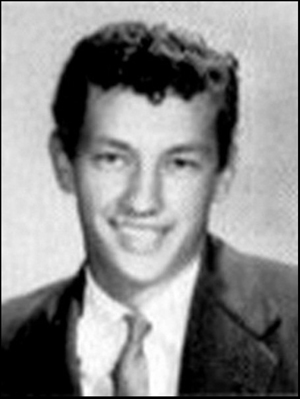
courtesy Tom Reece

Remember...
Robert Arthur Clark
1946-1968
"Our flag does not fly because the wind moves it. It flies with the last breath of each soldier who died protecting it."
Unknown
Robert Arthur Clark was born on August 30, 1946, in Mannington, Marion County, West Virginia. His father, Herman Herbert Clark, had fought in World War II as a Chief Petty Officer in the Navy. His mother, Bertha Irene Ryan Clark, married Herman in 1932. Robert had one brother, William E. Clark, and three sisters, Virginia Sue Clark, Mrs. Charles Van Gilder, and Mrs. Bill Wyckoff.
Before his years of military service, Robert lived with his sister, Mrs. Charles Van Gilder, in New Cumberland, Maryland. He was a member of the Christian Church in Mannington, West Virginia.
During the time Robert was growing up, there were many large events happening in the U.S. as well as around the world. From 1950 to 1953, the U.S. was fighting the Korean War. West Virginia's economy was doing well, as was the rest of the country in the post-World War II economic expansion. The coal industry in the state employed more than 167,000 miners. In 1954, the West Virginia Turnpike was completed. Within the next decade, the civil rights movement intensified across the country. By the time Robert was 10 years old, events leading to the Vietnam War had started. In 1962, the U.S. was faced with the Cuban missile crisis. In 1963, West Virginia adopted the state song "West Virginia, My Home Sweet Home" and "This Is My West Virginia." The state then adopted the state colors of Old Gold and Blue. March 8, 1965, marked the official entrance of the U.S. into the Vietnam War. With all that was going on with the U.S., American efforts in the war only increased. Troop numbers increased to 400,000 in 1965, and then to 500,000 the following year.
Robert was assigned to the 4th Infantry Division of the U.S. Army, where he served from 1965-1968. The Ivy Division, as they were known, was the first line of defense against the North Vietnamese infiltrating along the Ho Chi Minh trail through Laos and Cambodia. On November 2, 1968, the South Vietnamese, with American support, began the "Accelerated Pacification Campaign" to expand security in the countryside. On December 20, 1968, in Binh Dinh, Vietnam, Sergeant Robert Arthur Clark, at the age of 22, was killed by small arms fire.
Sergeant Clark's Company Commander, Alfred Nelson, had this to say about him:
This was our second day in VC Valley and we had found WWII rations, rice, weapons, ammunition, with massive caves. Also, a sign wrote with charred wood, go this way Americans coming. Well, all of them didn't get out and found them. A couple of wounded and Bobby killed. I recall it like yesterday as Bobby was in a small ravine KIA and I jumped in with a couple of others to get him out when an NVA fired several rounds that went up the rocks sending fragments into right side of my body, very minor. A grenade and a clip from my AR-15 ended that. My command was to end early Jan 69 and Bobby was my only KIA, One too many, he was a great person, and one of men I could always count on.
Two years after the initial posting of Robert Clark's biography, West Virginia Archives and History received this additional information from Mike Buckley, who served with Bob in Vietnam:
I saw the encouragement to add to the story regarding my Squad Leader and best friend Bob Clark. I was there that day right next to him. I'd always thought that I would have loved to share with Bob's family not only his actions on that day but the nature of him as a man, a leader and a friend. No greater love than to lay down his life for his friends. I remember the day. . . Captain Nelson lost the top of his ear that day in addition to his other wounds. . . close enough so that it shaved his hair.Bob's nature was that of a "steady hand." To look back now, 50+ years later and realize that this "elder comrade" was all of 22 makes me pause. That day, we seemed to have stumbled upon what appeared to be an NVA training camp and unless you are in combat continually, you aren't necessarily ready for the ensuing action. One of our squad members took a bullet right in front of us. As was Bob's nature, he sprung to action jumping from a position of safety to the exposed rock where Stan now lay vulnerable to further fire. Bob was able to save Stan but at the price of his own life. I credit Bob with inspiring me, six months later, to "take under my wing" a new guy whose life I was able to save -- a West Virginian, like Bob.
Article prepared by JJ Martin and Virginia Cook, George Washington High School JROTC
December 2018

West Virginia Archives and History welcomes any additional information that can be provided about these veterans, including photographs, family names, letters and other relevant personal history.